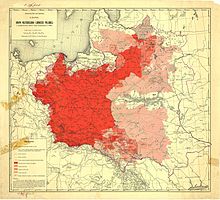
The Kresy myth (Polish: mit Kresów) ('myth' in Polish sometimes not referring to a necessarily false belief as in English) is the name to a certain sense of views or attitudes in connection to nostalgic attachment of the former eastern borderlands of Poland (Kresy), sometimes in an ethnic nationalist sense, sometimes as a multicultural land dominated by Polish culture.[1][2][3] According to Andrii Portnov, the Kresy is seen even as "'the lost paradise' of Poland’s 'civilisational mission'" at the same time as the location of "bloody and romantic clashes with the Cossacks and Tatars".[4] The Kresy was part of the Polish–Lithuanian Commonwealth and the Second Polish Republic but since 1945 is outside of Poland, in present-day Ukraine, Belarus, Lithuania.[3][5] The Kresy, in certain definitions, extend beyond the areas which became part of interwar Poland. In particular after the territorial changes, population transfers of World War II, the nostalgia focused on the Vilnius region and East Galicia.[6] It is argued exponents of the discourse tend to focus specifically on Poles, living in the Kresy without paying sufficient attention to the region's Ukrainian, Lithuanian, or Belarusian inhabitants.[7]
- ^ Czyżewski, Krzysztof (2012). "REINVENTING CENTRAL EUROPE". Yet Another Europe after 1984. Brill Rodopi. pp. 171–182. ISBN 978-94-012-0817-8.
- ^ Jansen, Jan; Lässig, Simone (October 2020). Refugee Crises, 1945-2000. Cambridge University Press. p. 79. ISBN 978-1-108-83513-8.
- ^ a b Cite error: The named reference
Bakuławas invoked but never defined (see the help page). - ^ Portnov, Andrii. "Clash of victimhoods: the Volhynia Massacre in Polish and Ukrainian memory". openDemocracy. Retrieved 29 October 2020.
- ^ Zarycki, Tomasz (2014). "The Kresy (old borderlands) discourse and its critics". Ideologies of Eastness in Central and Eastern Europe. Routledge. p. 142. doi:10.4324/9781315819006. ISBN 978-1-317-81857-1. S2CID 129401740.
- ^ Cite error: The named reference
Niemojewskawas invoked but never defined (see the help page). - ^ Cite error: The named reference
b2was invoked but never defined (see the help page).